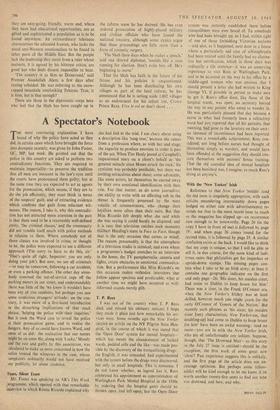A Spectator's Notebook
rrHE most convincing explanation I have heard of why the police have acted as they did, in certain cases which have brought the force into disrepute recently, was given by John Foster, QC, MP, last week. He pointed out that the police in this country are asked to perform two contradictory functions. They are required to maintain impartiality—to preserve the tradition that all men are innocent in the law's eyes until the courts have pronounced them guilty; but at the same time they are expected to act as agents for the prosecution, which means, if they are to do the job efficiently, they must think in terms of the suspects' guilt, and of extracting evidence which confirms that guilt from reluctant wit- nesses. The reason, I take it, why this contradie- don has not attracted more attention in the past is that there used to be a reasonably well-defined entity, 'the criminal classes,' and the community did not trouble itself much with police methods in relation to them. Where somebody not of those classes was involved in crime, or thought to be, the police were expected to use a different approach (I'm sorry to have to do this, sir.' 'That's quite all right, Inspector; you are only doing your job'). But now, we are all criminals —or may be tomorrow, following a car accident, or even a parking offence. The other day some- body removed the out-of-service caps off the parking meters in our street, and understandably there was little of the 'we know it wouldn't have been any a you residents, but perhaps you saw some suspicious strangers' attitude: on the con- trary, it was more of a first-hand introduction to the disturbing implications of that stock phrase, 'helping the police with their inquiries.' But it took the Ward case to reveal the police it their prosecution game, and to realise the dangers. Any of us could have known Ward, and .ome of us did: the realisation that our names -night be on some file, along with 'Lucky,' Mandy And the rest and guilty by this association, was :alculated to make us more concerned in how the .)olice treated the witnesses in the case, whose :omplaints ordinarily would not have received toy publicity, let alone credence.






























 Previous page
Previous page